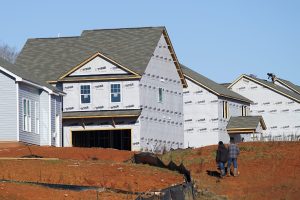
With the American dream of homeownership increasingly out of reach and many struggling to pay rent, North Carolina developers opposed to new energy-efficient construction rules are hinging their cause to the need for affordable housing.
“Look at your family. Look at your community,” said Dan Tingen, a builder and former board member of the powerful North Carolina Home Builders Association, at a public hearing held by the statewide panel in charge of building codes. “There’s no way you can justify this cost increase.”
But energy is also increasingly expensive, and proponents of the new standards argue that thicker insulation, better quality windows and other building features more than pay for themselves in the form of lower utility bills and improved indoor air quality.
“This is a bread-and-butter issue,” said Kim Wooten, a Durham engineer and member of the state’s Building Code Council. “It affects affordability and cash flow.” A better code, she said, “is doing something to help people have more money in their pockets.”
The two camps will face off this week at a meeting of the 17-member panel, where competing measures are on the agenda: one freezing the state’s 2009-era energy conservation code in place, and another bringing it in line with the latest international guidelines.
Get connected
Every morning, thousands of energy professionals turn to our newsletters for the day’s most important news. Sign up for free to get the latest delivered straight to your inbox.
But advocates caution against false equivalence of the opposing views.
“The best building technology scientists in the world show that, over the long term, the modern building energy codes save the homeowner money,” said Ben Evans, federal legislative director at the U.S. Green Building Council. “It’s pretty clear that this a case where there’s a special interest.”
Even as rising interest rates bring home sale prices closer to earth, North Carolina faces an undeniable crisis of housing affordability. The median cost of a home stood at $361,000 in April, according to Redfin, slightly more than a year ago and up 20% compared to 2019. The price tag is between two and three times what a family earning the state’s median income can afford.
In this context, developers contend that virtually any increase in the cost of a new home is catastrophic, especially for first-time home buyers.
“This is really going to not just affect the builders,” said one employee of D.R. Horton at the public hearing earlier this year. “It’s going to affect the homeowners.”
But there’s little evidence that tighter efficiency rules are impacting sale prices. Of the dozen states with lower median home prices than North Carolina, per the National Home Builders Association, nine have tougher energy conservation code requirements. The list includes other fast-growing states like Georgia and Delaware.
Indeed, most analysts say home prices have risen because of the basic laws of supply and demand: available housing units have not kept pace with population growth. In a December report, the conservative Cato Institute, for instance, concluded that local zoning regulations were mostly to blame for this mismatch. Building codes weren’t mentioned.
And while the state’s developer lobby often points to findings showing that even a $1,000 cost increase could price thousands out of buying a home, that analysis doesn’t account for the long-term savings in utility bills that could offset that premium.
Multiple observers have also questioned the figures distributed by the North Carolina Home Builders Association, which claim the new rules would add nearly $17,000 to the price of a new house before markup.
For one thing, advocates say, the figures fit a pattern of business lobbies crying wolf in the face of proposed new rules.
“We’ve had decades of industries warning about the expensive cost of complying with new regulation,” said David Neal, senior attorney with the Southern Environmental Law Center, at the March public hearing. “What we’ve seen is that those costs to comply with new regulations are orders of magnitude less than what was predicted.”
Reflecting anecdotal wisdom from many builders already adhering to tighter energy conservation standards, Granite Falls, North Carolina builder Rob Howard critiqued the Home Builders estimate line-by-line and arrived at a price differential closer to $6,000 before markup.
“It does feel like there’s a bit of misinformation,” he told the Energy News Network before conducting his analysis.
An independent government lab, meanwhile, concluded in March that the new code would add about $5,000 to the cost of a home but save nearly $400 annually in energy bills, creating a positive cash flow from the get-go.
With Duke Energy – the utility monopoly that serves most of the state — proposing to raise electric rates by upwards of 30%, observers say those savings for new homeowners could be even greater.
“Spikes in natural gas prices have already come onto consumer bills,” Neal said at the hearing. “That’s going to make these stronger conservation codes even more effective for consumers.”
The Department of Insurance has also suggested that the state’s outdated building codes could put upward pressure on property insurance premiums, though it doesn’t have an exact figure of how much.
“It can’t be a positive aspect,” department spokesperson Barry Smith said. “It can only be a negative.”
But the developer lobby has remained unfazed by these arguments. A proposed compromise between opposing factions on the Building Code Council fell flat at the end of April — in part because advocates tried to address builder concerns without sacrificing energy savings.
Developers’ most outspoken advocate on the council, Concord builder Gary Embler, also rejected criticism of the North Carolina Home Builders Association’s numbers.
“These costs are not inflated,” he said. “This is going to be the cost for North Carolina citizens, and we’re going to be knocking a whole slew of first-time homebuyers out of the market.”
The impasse means Embler will move at Tuesday’s meeting to keep the energy conservation code as is; if it passes, the issue will be subject to a public hearing in September. Later in the agenda, the council will vote on whether to adopt the new standards.
And even if the panel votes to overhaul energy conservation rules, the dispute is likely to rage on in the North Carolina General Assembly, where the House last month passed a bill cementing the existing code until 2031.
But advocates for advancing tougher conservation rules — including Gov. Roy Cooper, a second-term Democrat who has championed clean energy — hope the legislature might ultimately be a forum where minds can meet.
“We know that technology is moving so fast, and that we can save money in the long run by being energy efficient. It’s really smart for us to take those steps now,” Cooper told the Energy News Network.
“If the legislature is going to stop [the new code] in its tracks, you’re not going to have time for all of that conversation and negotiation to make sure we have the right result at the end of the day,” the governor said. “I do encourage that. I discourage just cutting it off at the pass.”



